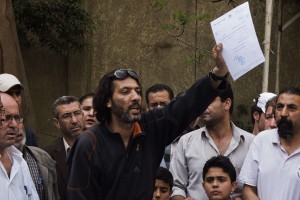
(AFP File Photo)
More than 50 Syrian and Palestinian refugees detained in an Alexandria jail have announced a hunger strike to protest “inhumane treatment”.
73 refugees, among them women and children, have spent over 100 days in detention at Karmooz police station in Alexandria after they were forced to land in Egypt. The group were heading to Europe, fleeing the atrocities of civil war in Syria, according to one of the detainees.
One of the detainees, Mohamed Darwish, told Daily News Egypt that the 73 detainees include 15 Syrians, 58 Palestinians, eight women and two children.
He also said that 50 of the detained refugees started an open hunger strike a week ago.
He added that all the detained refugees fled Syria and headed to Turkey by sea to Europe, when the “mafia of illegal immigration” forced them to land in Egypt.
A support group called the Karmooz Refugees released a statement issued by the detainees to mark the start of the hunger strike. In the statement, they said: “We, the trapped people at Karmooz jail in Alexandria, Egypt for over 100 days, and due to suffering from the lack of care by international organisations and human rights foundations, announce an open hunger strike as an attempt to draw world attention to our plight.”
The statement added: “We were forced by arms to land down the Egyptian coast to be treated as prisoners within conditions that are far from human life, which led to aggravation of the crisis and the spread of physiological and psychological diseases among us.”
Figures from the UNHCR estimate that almost 3,500 people died attempting to cross the Mediterranean Sea to reach Europe in 2014 and over 200,000 people were rescued in the Mediterranean during the same period.
The refugee’s statement called on for “coordination between the concerned parties to provide us access to European countries as our families’ members are available there”.
The organisations that the refugees seek help from are the UNHCR, UNRWA, International Committee of the Red Cross (ICRC), Amnesty International, Human Rights Watch (HRW), UNICEF, and embassies of European Union countries in Egypt.
Darwish said that communications have occurred with Amnesty International, HRW, ICRC and the UNCHR office in Egypt. He said that Amnesty International issued an initial report on the case, while the other organisations did not respond.
Amnesty International’s report, published in November, called for the immediate release of the refugees, highlighting the illegality of their detention and the bad conditions they face in the jail.
The report read: “Unlawfully detained in the country… the refugees are being detained in poor conditions, with some held in rooms infested with cockroaches, mosquitoes and mice.”


